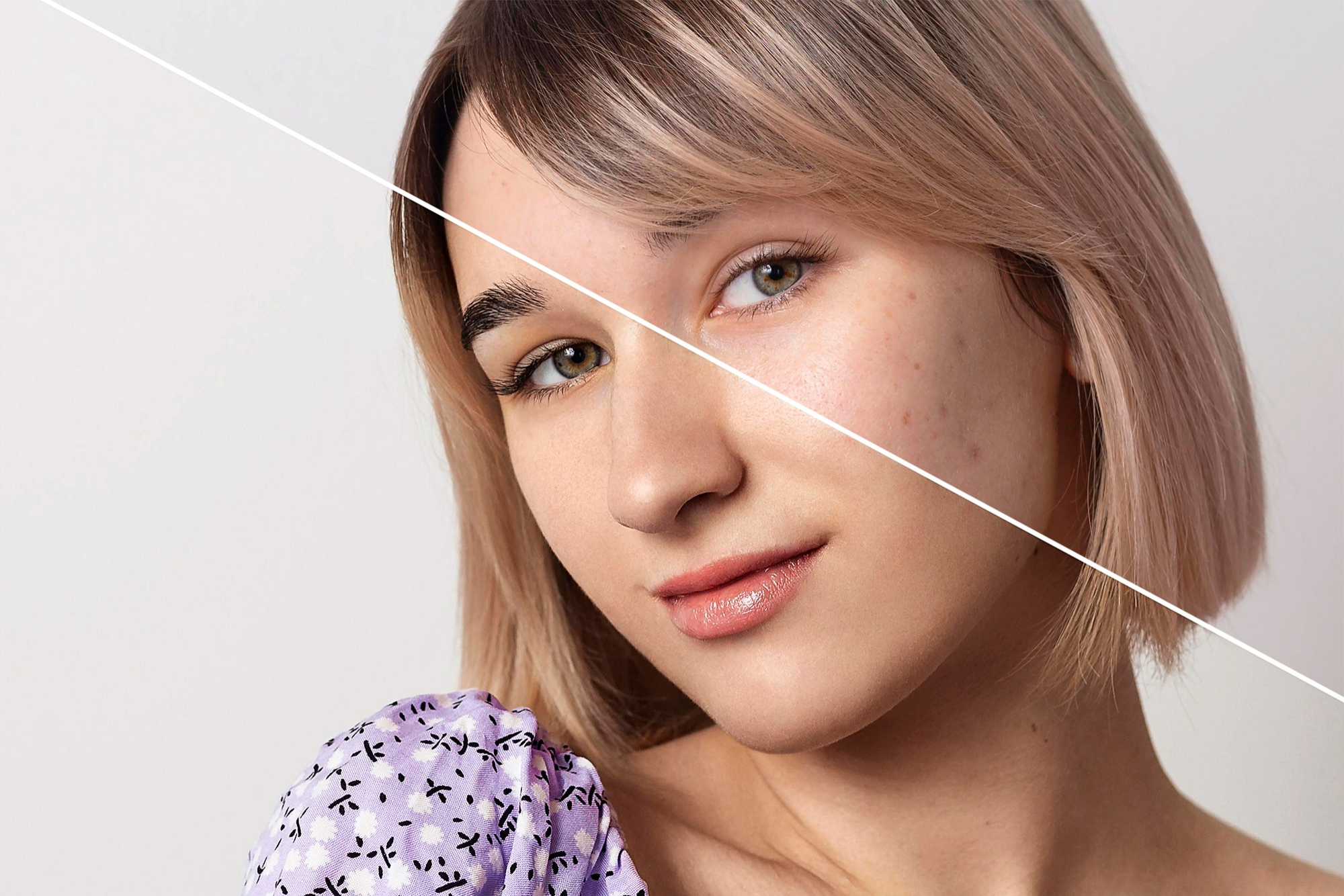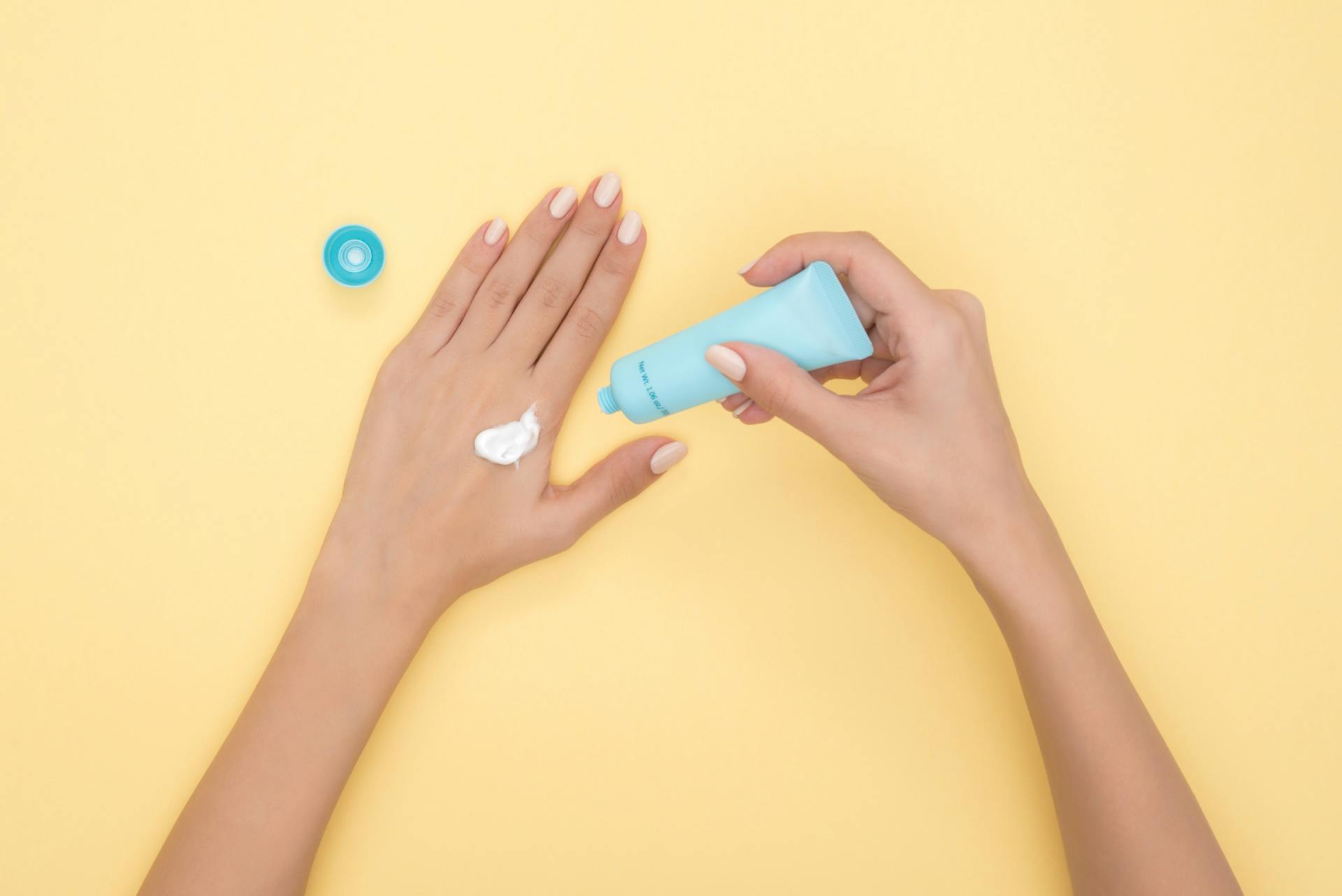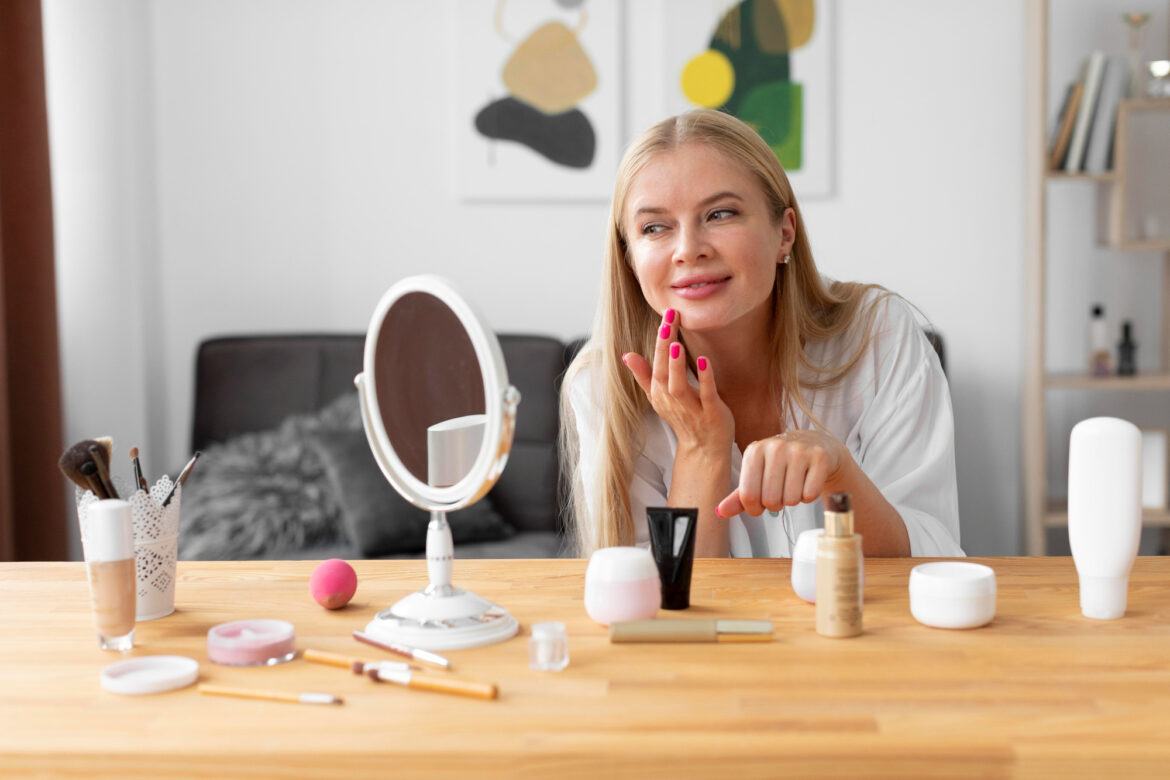Menopause is a natural phase that every woman experiences, typically around the age of 50. However, it can affect your skin in ways that may be unexpected or challenging to manage. This guide will help you understand: How to take care of your skin during menopause. It will also discuss the changes and offer practical skincare tips to keep your skin healthy and radiant during menopause.
Table of Contents
ToggleUnderstanding Menopause and Skin Changes
During menopause, estrogen levels drop, which affects collagen production, oil levels, and skin elasticity. Here’s what you might experience:
- Increased Dryness: Less oil production can make the skin dry and flaky.
- Wrinkles and Sagging: Collagen loss can lead to wrinkles and reduced skin elasticity.
- Sensitivity and Redness: Skin may become more reactive to products and environmental factors.
- Changes in Pore Size: Loss of elasticity can cause pores to appear larger.

For more detailed information on these changes, you can visit Healthline’s guide to menopausal skin changes.
Essential Skincare Tips During Menopause
1. Hydration is Key
Hydration becomes even more crucial during menopause. Water helps maintain skin elasticity and hydration from the inside out. Drinking 8-10 glasses a day can make a big difference in how your skin feels. For more on why hydration matters, read this Medical News Today article.

Also Read: Best Skincare Routine for Dehydrated Skin
2. Choose a Gentle, Hydrating Cleanser
Avoid harsh soaps that can strip your skin of its natural oils. Look for cleansers with hydrating ingredients like glycerin, hyaluronic acid, or aloe vera. These ingredients help cleanse without drying. For recommendations on gentle cleansers, visit WebMD’s list of moisturizing cleansers.
3. Moisturize Twice a Day
Using a rich moisturizer morning and night is essential to combat dryness. Opt for products with ingredients like ceramides, shea butter, and squalane, which help restore the skin barrier and retain moisture. Here’s a guide on choosing moisturizers for mature skin.
4. Don’t Skip Sunscreen
Sun protection is crucial at any age, but especially during menopause. UV rays can exacerbate wrinkles and age spots. Use a broad-spectrum sunscreen with SPF 30 or higher daily, even on cloudy days. Learn more about why sunscreen is important.

Also Read: Do Homemade Sunscreens Actually Work? A Comprehensive Guide
Best Ingredients for Menopausal Skin
1. Hyaluronic Acid
Hyaluronic acid is a hydration powerhouse. It holds up to 1,000 times its weight in water, which helps to keep your skin plump and smooth. It’s available in serums and moisturizers, making it easy to add to your routine. For more on hyaluronic acid, visit Healthline.
2. Retinol
Retinol is a form of vitamin A that helps reduce fine lines and wrinkles by boosting cell turnover. Start with a low concentration to avoid irritation and use it at night. Retinol is available over the counter or in prescription-strength forms. Here’s a beginner’s guide to retinol.
Also Read: When and How to Use Retinol: Best Age, Time, Skin Care Order
3. Vitamin C
Vitamin C is a potent antioxidant that brightens skin and fights free radicals, which can cause aging. It’s also effective at reducing dark spots and improving skin tone. Learn more about the benefits of vitamin C and how to add it to your routine.
4. Peptides
Peptides are small proteins that support collagen production, which can help improve skin firmness and elasticity. They’re great for mature skin as they can minimize the appearance of fine lines. For more on peptides, visit Healthline’s guide.
5. Niacinamide
Niacinamide, or vitamin B3, is known for reducing inflammation, minimizing pore size, and improving the overall texture of the skin. It’s especially beneficial for sensitive and reactive skin. For a detailed overview, check out the benefits of niacinamide.
Tips for Managing Menopausal Skin Concerns
1. Combatting Dryness
- Use a Humidifier: Adding moisture to the air can help keep your skin hydrated, especially in the winter.
- Avoid Hot Showers: Hot water can strip your skin of its natural oils, making dryness worse. Stick to lukewarm water instead.
- Apply Moisturizer on Damp Skin: Lock in moisture by applying your cream or lotion while your skin is still slightly damp.
2. Reducing Wrinkles and Fine Lines
- Try Facial Massage: Regular massage can boost circulation and promote lymphatic drainage, which may help improve skin firmness. Here’s how to do a facial massage at home.
- Consider Collagen Supplements: Some studies suggest that collagen supplements can help improve skin elasticity and hydration. Learn more about collagen supplements.
3. Soothing Sensitive Skin
- Use Fragrance-Free Products: Fragrances can irritate sensitive skin, so choose products that are labeled “fragrance-free” or “unscented.”
- Look for Calming Ingredients: Aloe vera, chamomile, and oatmeal are known for their soothing properties. Here’s more on how to calm sensitive skin.
4. Addressing Dark Spots and Uneven Skin Tone
- Use a Brightening Serum: Vitamin C, licorice extract, and kojic acid are effective at reducing hyperpigmentation. You can find products with these ingredients at Sephora.
- Consider Professional Treatments: Chemical peels and laser treatments can be effective for more stubborn dark spots. Consult with a dermatologist for options.
Lifestyle Tips for Healthy Skin During Menopause
1. Eat a Nutrient-Rich Diet
Focus on foods rich in antioxidants, omega-3 fatty acids, and vitamins. Omega-3s found in fatty fish can help keep skin supple, while antioxidants in fruits and vegetables protect against environmental damage. Here are some foods that promote healthy skin.
2. Exercise Regularly
Exercise boosts circulation, which helps nourish skin cells and keeps them vital. It also helps reduce stress, which can prevent inflammation and flare-ups. Read about the benefits of exercise for skin health.
3. Get Plenty of Sleep
During sleep, your body repairs itself, which is essential for healthy skin. Aim for 7-8 hours a night to allow your skin time to renew. Here’s why sleep is essential for skin health.
4. Manage Stress Levels
High stress can trigger skin issues like dryness and breakouts. Try activities like meditation, yoga, or deep breathing exercises to keep stress under control. Learn how stress affects the skin.
Recommended Products for Menopausal Skin
- Cleansers: Look for hydrating cleansers with hyaluronic acid, such as CeraVe Hydrating Cleanser.
- Moisturizers: Choose rich creams with ceramides and peptides, like Olay Regenerist Micro-Sculpting Cream.
- Serums: Opt for serums with vitamin C and peptides, such as The Ordinary Buffet + Copper Peptides.
- Sunscreens: Pick a broad-spectrum sunscreen with SPF 30 or higher. La Roche-Posay Anthelios Melt-in Milk Sunscreen is a good option for mature skin.
For more product ideas, check out Sephora’s collection for mature skin.
Conclusion: Embrace Your Skin’s Journey During Menopause
Taking care of your skin during menopause can be a rewarding journey. While hormonal changes may bring new challenges, they also offer an opportunity to refine your skincare routine. Focus on hydration, gentle ingredients, and lifestyle habits that support overall wellness. Remember, your skin deserves extra care during this phase, and with the right approach, you can maintain a healthy, radiant glow. Embrace the changes, prioritize self-care, and enjoy the confidence that comes with caring for your skin.
FAQ: Taking Care of Your Skin During Menopause
1. How does menopause affect my skin, and what changes can I expect?
Menopause can lead to several skin changes due to a decrease in estrogen levels. You may notice increased dryness as oil production slows down, along with reduced elasticity, which can contribute to sagging and wrinkles. The skin may also become more sensitive and prone to irritation, and you might see changes in pigmentation, such as age spots. These changes occur because lower estrogen levels affect collagen and hydration, two crucial elements for healthy, youthful skin.
2. What type of moisturizer is best for menopausal skin?
Menopausal skin tends to be drier, so it’s essential to use a rich, hydrating moisturizer. Look for products containing ingredients like hyaluronic acid, ceramides, shea butter, and glycerin, which help to restore moisture and strengthen the skin barrier. A nighttime moisturizer can also include peptides to promote collagen production. Consider a moisturizer with SPF for daytime use to protect against UV damage, which can further exacerbate aging signs.
3. Should I use retinol during menopause, and is it safe for mature skin?
Yes, retinol can be beneficial for menopausal skin as it helps with cell turnover, reduces the appearance of fine lines, and improves skin texture. However, because menopausal skin can be more sensitive, it’s best to start with a low concentration and gradually increase as your skin adjusts. Use retinol only at night and follow up with a moisturizer. Also, apply sunscreen during the day, as retinol can increase sun sensitivity. Here’s how to introduce retinol safely.
4. How can I manage skin sensitivity that seems to have increased during menopause?
Menopausal skin can become more reactive due to hormonal changes. To manage sensitivity, choose fragrance-free and hypoallergenic products. Avoid harsh exfoliants and alcohol-based products, as they can strip the skin of its natural oils. Ingredients like aloe vera, chamomile, and niacinamide are soothing and help to calm irritation. Always patch-test new products before applying them to your face.
5. Are there any natural remedies that can help with dry skin during menopause?
Yes, several natural remedies can help alleviate dry skin. Applying aloe vera gel can soothe and hydrate, while honey masks can lock in moisture. Oils like coconut oil, olive oil, and argan oil are excellent for nourishing the skin, but it’s best to use them sparingly to avoid clogging pores. Oatmeal baths can also soothe dryness and irritation. However, it’s always a good idea to consult with a dermatologist before trying natural remedies to ensure they’re suitable for your skin.
6. Is sunscreen necessary if I’m mostly indoors, especially during menopause?
Absolutely. Sunscreen is essential at any age and regardless of how much time you spend outdoors. UV rays can penetrate windows and cause skin damage, leading to wrinkles, age spots, and increased sensitivity. Choose a broad-spectrum SPF of at least 30 and apply it daily as the final step in your morning skincare routine. For more on the importance of sunscreen, visit The Skin Cancer Foundation.
7. How often should I exfoliate my skin during menopause?
Exfoliation is essential for removing dead skin cells and promoting a brighter complexion, but menopausal skin can be more sensitive, so it’s important to be gentle. Aim to exfoliate once or twice a week using a mild exfoliant, such as a product with lactic acid or glycolic acid. Avoid harsh scrubs, which can cause micro-tears and further irritate the skin. Always follow up with a moisturizer after exfoliating.
8. What dietary changes can improve my skin during menopause?
A balanced diet rich in antioxidants, omega-3 fatty acids, and vitamins can benefit menopausal skin. Omega-3s, found in fatty fish and flaxseeds, help maintain hydration and reduce inflammation. Antioxidant-rich foods like berries, leafy greens, and nuts protect against free radicals, which can accelerate aging. Staying hydrated by drinking plenty of water is also essential for maintaining skin elasticity and moisture.
9. Can hormone replacement therapy (HRT) improve my skin during menopause?
Hormone replacement therapy can alleviate some menopausal symptoms, including skin changes. By boosting estrogen levels, HRT may help improve skin elasticity and hydration. However, HRT is not suitable for everyone and carries potential risks. It’s essential to consult with your healthcare provider to discuss whether HRT is right for you and to weigh its benefits and risks.
10. Are there specific ingredients I should avoid in skincare products during menopause?
During menopause, it’s best to avoid products with harsh ingredients like sulfates, parabens, and synthetic fragrances, as they can irritate sensitive skin. Alcohol-based products should also be avoided, as they can dry out the skin. Opt for products labeled “gentle” or “for sensitive skin,” and focus on ingredients that provide hydration and support collagen production, such as peptides, ceramides, and hyaluronic acid.
